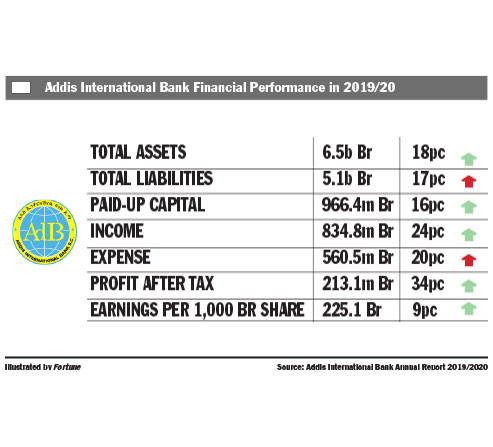
Fortune News | May 31,2020
The latest in a cascade of similar firms, Mulugeta Mekonnen Melesse Bottled Water Company is breaking ground in Yibab, a rural kebelelocated a few kilometres away from Bahir Dar, Amhara Regional State. The total investment for the plant is expected to reach 100 million Br.
Sprawling across 4,000Sqm of land, the company has finalised drilling its two water wells for the production of 24,000lt of water an hour at its plant. The two wells are each 250m deep, and the company undertook the drilling itself at the cost of five million Birr. The entire project is expected to be finalised in six months.
Though a brand name has yet to be decided on for the bottled water, half of the construction has already been completed. This includes all substructural works, fencing, storage facilities and road networks, according to Fikrealem Ketema, the company's drilling project manager.
"We're waiting for the blowing machine to be imported and for treatment centres to start operations," he said.
The project, advised by Dallol Consultants, will produce 500ml, one-litre, and two-litre water bottles. Dallol, which has expertise in the fields of architecture, planning and engineering, has been advising a number of construction projects including textile factories, hospitals and resorts for nearly five years.
Mulugeta Mekonnen Melesse, the company behind the venture, was established over a decade ago and owns a flour mill as well as drilling and plastic bag production companies. It also engages in the export of cereal crops and pulse seeds and the import of machinery, spare parts and trading accessories.
Currently, there are a little over 100 bottled water companies operating in the country. But the rising number of new entrants to the industry shows that there has been little research into profitability, according to Ashenafi Merid, general manager at the Ethiopian Bottled Water, Soft drink, Fruits & Vegetable Processing Manufacturing Industries Association.
"The Association is currently assessing the viability of this businesses venture," he said. "We want to show the status of the industry and request the intervention of the government."
The supply capacity of the operational bottled companies in the country aggregates to 30 million litres of water a day, while the sales have not peaked above eight million, according to data from the Association, which also estimates that nearly 35,000 people are employed under it.
This shows that the manufacturers are operating well below their capacity, added Ashenafi.
"It's a costly venture with nearly all the raw materials for production obtained through import," said Ashenafi. "This translates to higher costs and limited forex availability."
Among the requests that are planning to be tabled is the call to audit operational companies and the provision of tax relief.
But according to some experts, the costs associated with bottled water companies are very marginal.
The major costs for a bottled water company are in water drilling, according to Andualem Tilahun, a hydraulics engineer with over 13 years of experience. The water, which is sourced from groundwater, requires minimal treatment as it mainly has physical and mineral impurities, according to him.
"The mineral concentration itself is something that is taken into consideration upon site selection," he said. "This is why you don't see many companies setting up in Adama, for instance, where there is a high fluoride concentration."
Andualem argues that the demand is also higher than what current companies provide, stating that players in the industry may be unwilling to share the profitability of the venture.
But there should be more investment in waste treatment, adds Andualem.
"There needs to be a better plastic bottle collection system set up," he said. "The plastic bottles are a big source of litter in the cities and also clog drainage systems."
PUBLISHED ON
Dec 12,2020 [ VOL
21 , NO
1076]

Fortune News | May 31,2020

Radar | Oct 09,2021

Fortune News | Aug 11,2024

Viewpoints | Dec 21,2019

Viewpoints | Jun 12,2021

Radar | Aug 30,2025

Fortune News | Jun 19,2021

Fortune News | Apr 03,2021

Radar |

Radar | Sep 21,2019

Dec 22 , 2024 . By TIZITA SHEWAFERAW
Charged with transforming colossal state-owned enterprises into modern and competitiv...

Aug 18 , 2024 . By AKSAH ITALO
Although predictable Yonas Zerihun's job in the ride-hailing service is not immune to...

Jul 28 , 2024 . By TIZITA SHEWAFERAW
Unhabitual, perhaps too many, Samuel Gebreyohannes, 38, used to occasionally enjoy a couple of beers at breakfast. However, he recently swit...

Jul 13 , 2024 . By AKSAH ITALO
Investors who rely on tractors, trucks, and field vehicles for commuting, transporting commodities, and f...

Oct 25 , 2025
The regulatory machinery is on overdrive. In only two years, no fewer than 35 new pro...

Oct 18 , 2025
The political establishment, notably the ruling party and its top brass, has become p...

Oct 11 , 2025
Ladislas Farago, a roving Associated Press (AP) correspondent, arrived in Ethiopia in...

Oct 4 , 2025
Eyob Tekalegn (PhD) had been in the Governor's chair for only weeks when, on Septembe...